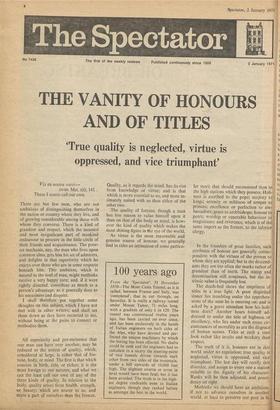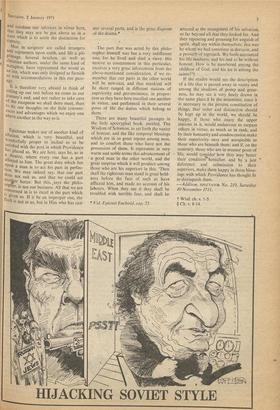THE VANITY OF HONOURS AND OF TITLES
`True quality is neglected, virtue is oppressed, and vice triumphant'
Vix ea nostra vow:— OVID. Met. xiii, 141 These I scarce call our own.
There are but few men, who are not ambitious of distinguishing themselves in the nation or country where they live, and of growing considerable among those with whom they converse. There is a kind of grandeur and respect, which the meanest and most insignificant part of mankind endeavour to procure in the little circle of their, friends and acquaintance. The poor- est mechanic, nay, the man who lives upon common alms, gets him his set of admirers, and delights in that superiority which he enjoys over those who are in some respects beneath him. This ambition, which is natural to the soul of man, might methinks receive a very happy turn; and, if it were rightly directed, contribute as much to a person's advantage, as it generally does to his uneasiness and disquiet.
I shall therefore put together some thoughts on this subject, which I have not met with in other writers; and shall set them down as they have occurred to me, without being at the pains to connect or methodise them.
All superiority and pre-eminence that one man can have over another, may be reduced to the notion of quality, which, considered at large, is either that of for- tune, body, or mind. The first is that which consists in birth, title, or riches; it is the most foreign to our natures, and what we , can the least call our own of any of the three kinds of quality. In relation to the body, quality arises from health, strength, or beauty; which are nearer to us, and more a part of ourselves than the former. Quality, as it regards the mind, has its rise from knowledge or virtue; and is that which is more essential to us, and more in- timately united with us than either of the other two.
The quality of fortune, though a man has less reason to value himself upon it than on that of the body or mind, is how- ever the kind of quality which makes the most shining figure in the eye of the world.
As virtue is the most reasonable and genuine source of honour, we generally find in titles an intimation of some particu- lar merit that should recommend men to the high stations which they possess. Holi- ness is ascribed to the pope; majesty to kings; serenity or mildness of temper to princes; excellence or perfection to am- bassadors; grace to archbishops; honour to peers; worship or venerable behaviour to magistrates; and reverence, which is of the same import as the former, to the inferior clergy.
In the founders of great families, such attributes of honour are generally corres- pondent with the virtues of the person to whom they are applied; but in the descend- ants they are too often the marks rather of grandeur than of merit. The stamp and denomination still continues, but the in- trinsic value is frequently lost.
The death-bed chews the emptiness of titles in a true light. A poor dispirited sinner lies trembling under the apprehen- sions of the state he is entering on; and is asked by a grave attendant how his holi- ness does? Another hears himself ad- dressed to under the title of highness or excellency, who lies under such mean cir- cumstances of mortality as are the disgrace of human nature. Titles at such a time look rather like insults and mockery than respect.
The truth of it is, honours are in this world under no regulation; true quality is neglected, virtue is oppressed, and vice triumphant. The last day will rectify this disorder, and assign to every one a station suitable to the, dignity of his character. Ranks will be then adjusted, and prece- dency set right.
Methinks we should have an ambition, if not to advance ourselves in another world, at least to preserve our post in it,
What, democracy?
SIMON RAVEN
'Of course,' said an old liberal chum (female), 'I haven't been to Greece since the Colonels took over. I don't care to go there while there's a Fascist government.'
`You go to Spain often enough.'
`Spain's different and Franco's been there a long time. But this sort of thing just should not be allowed in Greece. Athens was the cradle of democracy, you know.'
Indeed I knew. The same dreary cliché had been dragged out in every discussion about Greece for the last three years. And yet what had been the reality behind the myth? A few thousand citizens, privileged to vote, had lorded it over a huge majority of slaves and metics. 'Democracy': it all depended on what one meant by 'demos'.
The worrying thing is,' my chum went on, `that more and more people who've been there tell me that the Greeks rather like it ... what's going on now, I mean.'
'If the Greeks like it, who are we to com- plain?'
`They oughtn't to like it,' she said severely : 'the descendants of Pericles should set a better example.'
`They're not his descendants, not really. For every one part of Pericles in their veins, there's 99 parts of assorted Turk, Frank, Roman and Egyptian. And anyway,' I said, 'the important question is: do they like their Government or don't they?'
be friendly, public transport is viable, and the armed services are in excellent condition. These, as it happens, are all assertions which the Government has chosen to publish in a proclamation which hangs in every public building; but although such boastfulness is both suspect and offensive, the statements made are nevertheless true. Or so I was told by all those whom I consulted. Not all of them were glad of this; the more liberal, though delighted that there were no strikes, were not very happy about the reasons (vaguely and direly hinted at) for their cessa- tion. Indeed, even the more authoritarian of those I spoke to are rather disquieted by all this efficiency; somehow it seems too good to be true, to be tempting Nemesis. In the Balkans the custom has always been that the trains do not run on time, and their present punctuality could be seen as a dangerous breach of tradition.
The regime, though right wing, is not up- per-class. Very few Greek officers are gentlemen (as we understand the term) and many have come to soldiering as their grandfathers came to the priesthood . . . because there are few other ways in which poor but literate boys may advance themselves. The 'Colonels' and their lieutenants were not polo-playing dandies from smart regiments (for indeed there is no such thing as a smart regiment): they. were narrow, ill read, patriotic, lean and puritanical men from some of the poorest provincial backgrounds in Europe. This must be the least 'snobbish' regime in the history of Greece.
course; but at least they are keeping the package tourists all together by the sea and not encouraging them to go inland, where they might affront the rich expatriates. For however `unsnobbish' the regime may be, there is always deference for well-heeled foreigners.
The theatre (this a particular concern in Athens) is more free than it was. There has even been a satirical revue, which was allowed to take off politicians for six months ... until at last it went too far. How far was that? Well, it sprung a new joke without warning. Although the Government is now confident enough to allow jokes about itself, it likes to be warned in advance. It will put up with a rotten egg which is aimed from a fair distance but is still nervous of treading on the cunningly placed banana skin.
Now, everything I have reported above was agreed upon, in substance, by all those whom I inquired of. What they couldn't agree on, predictably enough, was whether or not they liked it. About this there is much equivocation. A moderate Athenian liberal told me that although he strongly disap- proved of the regime in principle, he was very well suited in practice. He hoped the regime would stay; he would cheer to the echo should it be deposed. A rather disreputable friend of his told me that the regime was simply a bore. Actually to be able to rely on trains, and even on officials, took the fun out of life. Who wanted to ar- rive in Thessalonika on time? Or who wanted justice from bureaucrats? One wanted one's own way, and that was best procured by bribery . . . since the end of which, by the by, one had to queue up with the peasants.







































 Previous page
Previous page